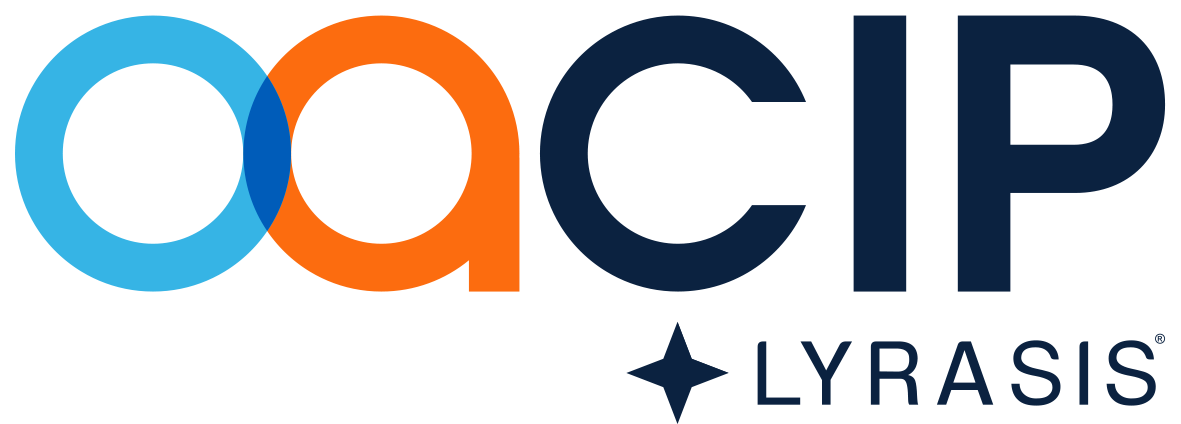
LYRASIS is pleased to announce that the supporters of the LYRASIS Open Access Community Investment Program (OACIP) have achieved the 2022 funding goals!
What is OACIP?
OACIP [pronounced O-A-C-I-P] is a community-driven framework that enables collective stakeholders to evaluate and fund open access content initiatives in a strategic way. OACIP brings together investment opportunities in one place and also provides important and consistent information about those opportunities that support informed and principled investment decisions. Using this approach, OACIP provides tailored match-making between mission-driven scholarly publishers that are seeking financial investments from entities that want to support OA publishing aligning with their mission and values.
Round Two OACIP-Participating Journals
OACIP launched in 2020, piloting the program with two OA Diamond journals. OA Diamond journals publish immediate OA content with no fees for authors or readers. Both journals met their fundraising goals to sustainably publish OA for the next five years. The second round of the program was built off the pilot’s success with three additional OA Diamond journals in need of investment:
- Algebraic Combinatorics (ALCO), a peer-reviewed, open access journal that published its first issue in January 2018. It is a specialty journal in the burgeoning field of algebraic combinatorics, spanning across and intricately linking several areas of mathematical research. The current journal is owned by mathematicians, dedicated to free dissemination of research, and committed to not charging fees for authors or readers. ALCO established a funding goal of $125,000 to cover its next five years of publishing. These funds will be used to cover costs such as copy editing and fair editor compensation.
- History of Media Studies (HMS), a new, peer-reviewed, scholar-run open access journal founded to augment understanding of the ways that media have been conceived, investigated, and studied around the world. The journal is published by mediastudies.press, a scholar-led, Diamond OA, nonprofit publisher launched in 2019. HMS established a funding goal of $62,500 to support five years of its publishing. Funds will be used to cover professional copy-editing/proofing, software, platform hosting, and other infrastructure.
- The Journal of Librarianship and Scholarly Communication (JLSC), a peer-reviewed open access journal particularly interested in the intersection of librarianship and publishing and the resulting role of libraries in both content dissemination and content creation. Publishing since 2012, JLSC became a publication of the Iowa State University (ISU) Digital Press in July 2021. JLSC established a funding goal of $90,000 to sustain five years of its publishing. Funds will be used to cover annual costs, including copy editing, layout, accessibility checking, and platform hosting.
Impact through Connectivity
One of the Content and Scholarly Communication Initiative Team’s values is connectivity - we endeavor to strengthen connections within and across communities to foster collaboration for broad and meaningful impact. In this second round, OACIP connected 39 institutions from four countries to the three OACIP journals needing support. Eighteen of those institutions participated through a consortial effort: Colby-Bowdoin-Bates Consortium and Big Ten Academic Alliance, which recently announced its participation in the program. This funding community committed $277,500 over the next five years to help each journal to meet its five-year funding goal.
Many have offered words of encouragement and support for OACIP, and we want to highlight below those who have offered financial support. They are making a big impact!
- Big Ten Academic Alliance
- Indiana University
- Michigan State University
- Northwestern University
- Ohio State University
- Pennsylvania State University
- Purdue University
- Rutgers University-New Brunswick
- University of Illinois at Urbana-Champaign
- University of Iowa
- University of Maryland
- University of Michigan
- University of Minnesota
- University of Nebraska-Lincoln
- University of Wisconsin-Madison
- University of Chicago
- Colby-Bates-Bowdoin Consortium
- Colby College
- Bates College
- Bowdoin College
- Gettysburg College
- Indiana University-Purdue University Indianapolis
- Iowa State University
- KU Leuven
- Massachusetts Institute of Technology
- Memorial University of Newfoundland
- Murray State University
- Technische Informationsbibliothek (TIB)
- University at Buffalo
- University of British Columbia
- University of California, Berkeley
- University of Kansas
- University of Massachusetts, Amherst
- University of North Carolina, Chapel Hill
- University of Rhode Island
- University of Saskatchewan
- University of Tennessee Knoxville
- University of Texas at Austin
- Wayne State University
- Western University
What’s Next for OACIP?
Is OACIP a success? We need more time to determine if the program is truly working well for all of the stakeholders. However, the program has exceeded our expectations. Since OACIP launched, 56 institutions from 4 countries have committed $522,535 to support 5 OA Diamond journals sustainably for 5 years. The program has also received endorsement by the steering committee of the Budapest Open Access Initiative in their recent 20th Anniversary Recommendations where OACIP was cited as a worthy program for the global library and funding communities to support. We have come far in a short period of time, but there is still much more that we can do together.
Next steps include:
- Creating a templated annual report for OACIP journals to complete each year to communicate how the funds were spent and share measures of impact.
- Selecting journals for Round Three and launching the next funding campaign in Fall 2022.
- Creating a more formalized OACIP Community that will help guide the future of the program. Representatives of institutions that have contributed support to OACIP will be invited to join.
We are connected through our actions. Publishing programs with an active funding community and sustainable infrastructure to support their efforts will be able to make a long-lasting impact toward a more diverse, inclusive, and equitable scholarly communication ecosystem. A network of support among community partners fosters the trust and energy that is required to take bold steps forward. We look forward to working with the growing OACIP Community to build something new together.
